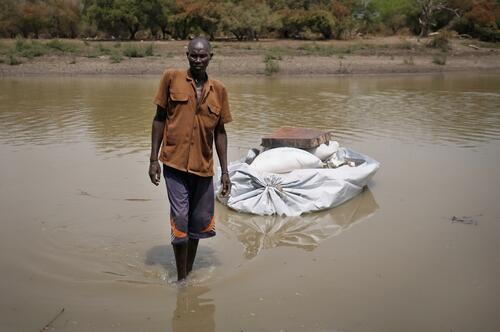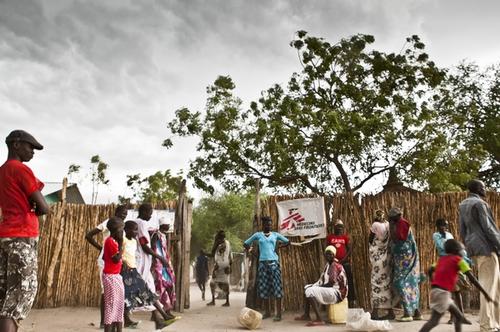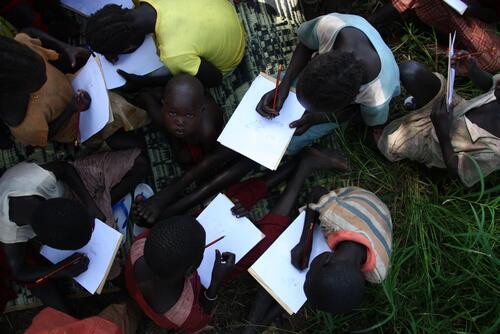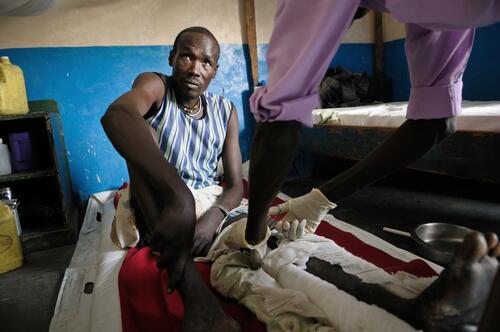David Bude is a Médecins Sans Frontières (MSF) clinician who was working in MSF’s health clinic in the remote village of Lekwongole, near Pibor town, in South Sudan’s violence-afflicted Jonglei State. When fighting erupted in Lekwongole in August 2012, he fled along with the rest of the population. While in hiding, deep in the bush, David used his medical skills to save lives in exceptionally difficult circumstances.
Fleeing for our lives
We ran from Lekwongole when there was shooting. I was frightened, and so was everyone else, because of what we had seen – because of the dead people.
I said to my wife that if we stay we will also be killed. It is better to run into the bush because we know where we can hide.
We crossed the river using plastic sheeting as boats. We tied lengths of plastic and put grass inside to make them more stable, so when we stepped inside they would not collapse. We ferried our children to the other riverbank, and then we ran, all of us, with our children and families. We didn’t have time to take any food or even any clothes or medicines. Everything was left behind.
Deep in the bush
We were deep in the bush, thick grass and undergrowth everywhere. No roads or tracks. I was scared – everyone was scared. You can’t see what is in the thick tall grass, and there are lots of dangerous things; snakes, hyenas, we heard lions at night – and even rebels or militia. You don’t know what’s hiding out of sight. You don’t know what will happen at night, or even during the daytime.
The area was flooded, so lots of water everywhere. Most people were just sleeping under trees without anything for shelter. Some people had some plastic sheeting with them and when it rained they would ask other people’s children to come under to shelter. People were helping each other because we were all there in the bush together.
The clinic under the tree
I chose a big tree, a good one with plenty of shade, and I cleaned all underneath it. I had a plastic sheet and I gave it to my wife to make a sort of rough shelter. She cut some branches and made a frame, and we put the plastic sheeting over it. And then I made a wooden platform, like a rough bed, to keep medicines off the ground. This was my pharmacy.
We cut some poles to make benches, so there was a waiting area for people to sit. And with poles and mud I made a sort of consultation room, so when a patient needed treatment I would see them in this ‘room’.
We got the message through to the MSF team in Pibor town about where we were, and they sent some drugs by boat to the closest place a boat could get to – medicines for antenatal care, people suffering diarrhoea, malnourished children, as well as antibiotics, dressings, malaria drugs, even registration cards and a register for keeping proper records.
Spreading the word
I found two of the health promoters from the MSF Lekwongole team. They went around passing the message that if your child is sick with anything – diarrhoea, eye infections, respiratory diseases, fever, injury or anything – come and see us.
And they came. A lot of people. Sometimes I saw 50 patients in one day. Malaria was common, and pneumonia, malnutrition – we admitted 16 children – and diarrhoea because there was no clean water. We even followed up on a TB patient. I kept going until the supply of medicines ran out.
Running out of medicine
In early September we had finished the stock of medicines, so I went back to Pibor town for more supplies. I went by foot, but the floods have been bad this year. Everywhere there was water, and I had to swim across even the smallest streams. I walked and swam for nearly two whole days to get to Pibor.
The MSF team in Pibor found a boat for me to go back to the bush. And then next time we finished that stock, I travelled by foot, with three guys from my medical team and again we came back by boat with the medicines to the clinic under the tree.
Saving lives
With this clinic we definitely saved lives. People were in real difficulties in the bush: not enough food, mosquitoes, everyone drinking very bad water.
I remember a young man who came during the night with severe malaria. He was crying out in the darkness, writhing around. So we tried to calm him and I did a rapid malaria test, which showed positive. So I started administering artemether injections. This was just after midnight.
We had a sort of inpatient department. But the problem was that I had nowhere for inpatients to stay. I just made sure they stayed nearby so if I needed to follow up with any of them, or give them medication, I could find them easily. I kept children with severe malaria right by the clinic for several days until they showed signs of improvement. And it was important for me to go and find the mothers of sick children to make sure they remembered what I had said about the medicines they had to take. And I had to do follow-up checks and sometimes give out new drugs to these patients.
There was one trauma patient who came just when we had run out of gauze. I just had to apply pressure, and try and try to stop the bleeding. We didn’t have any IV fluid to give the patient, so it was very difficult. But eventually I managed to stop the bleeding and some days later he recovered.
What if?
None of the patients I treated died. One man who was shot died, but he arrived already too weak and I could not save him.
But this was in a remote place, so it is hard to know how many people died because they fell ill and couldn’t come to be treated.
I think about the people who fled to places that were too far from my clinic. We saw lots of cases of malaria, so what has happened to the people who could not get medical treatment? I think the situation for them must have been very bad indeed.
Our clinic was not perfect, but it was better than nothing, and we saved lives.






